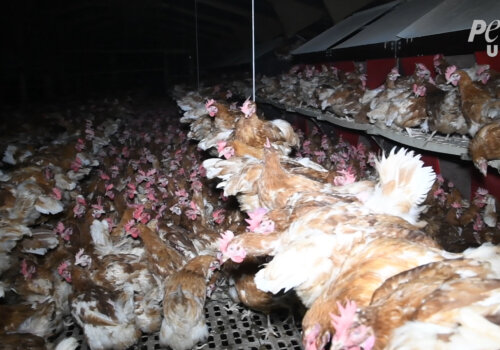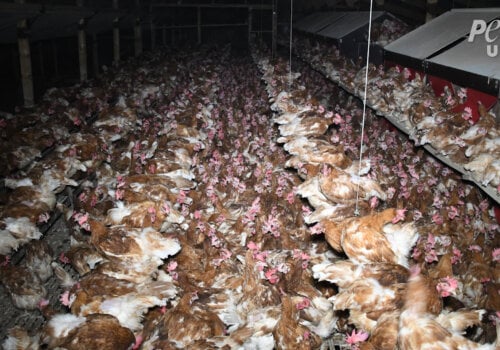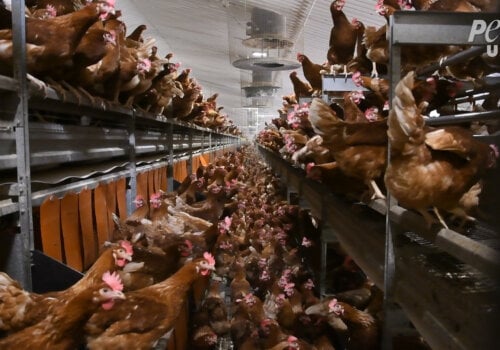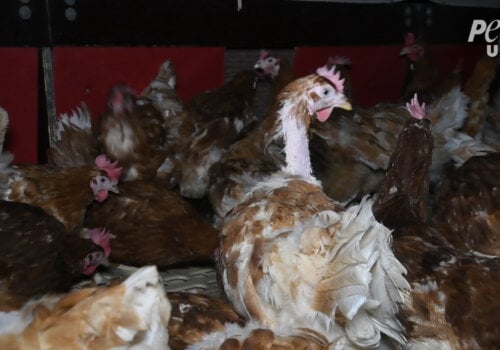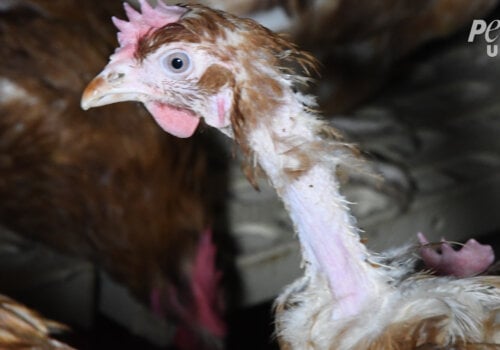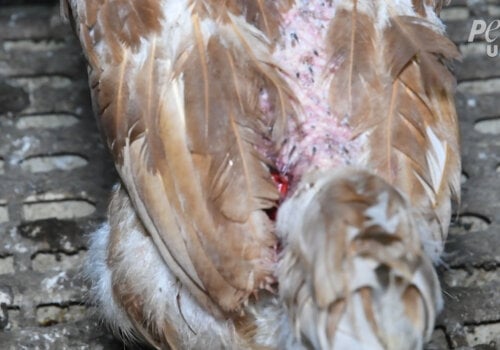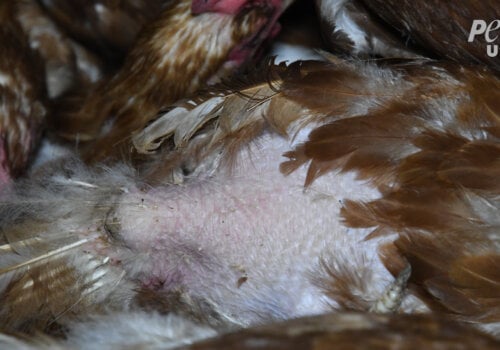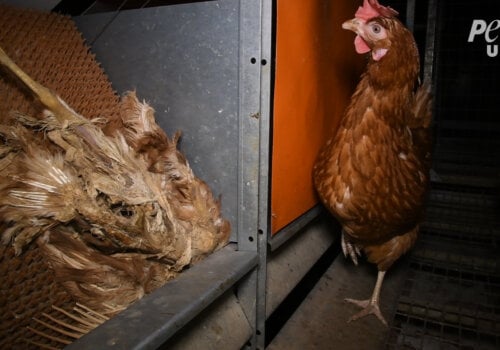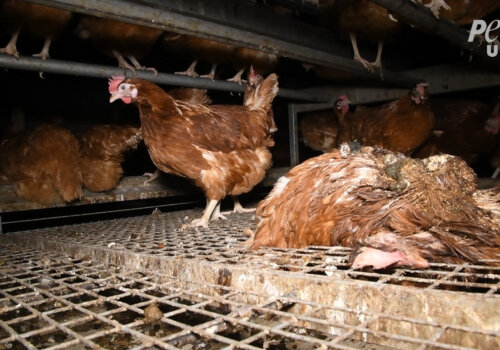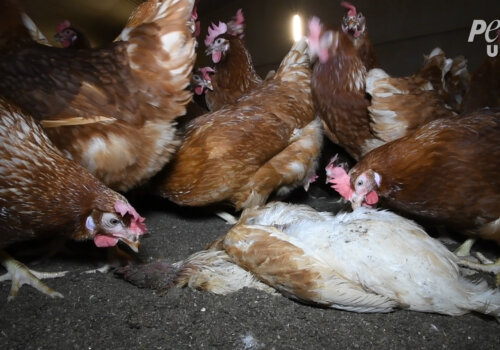The Happy Egg Co, owned by Noble Foods, is one of the largest free-range egg producers in the UK. PETA visited farms in Cumbria, Herefordshire, and Gloucestershire that supply eggs to the brand which are sold in all major supermarkets in the UK.
While the company’s marketing materials depict happy hens roaming vast green fields covered with foliage and trees, PETA’s footage tells a different story. Take a look at the way hens really live on farms supplying the Happy Egg Co:
Crammed Together
Even though the birds weren’t kept in cages, these disingenuously named “free-range” hens had little space when crammed inside sheds. Such cramped conditions can prevent chickens from performing natural types of behaviour, such as extending their wings, stretching their necks for foraging activities, and properly roosting and resting.
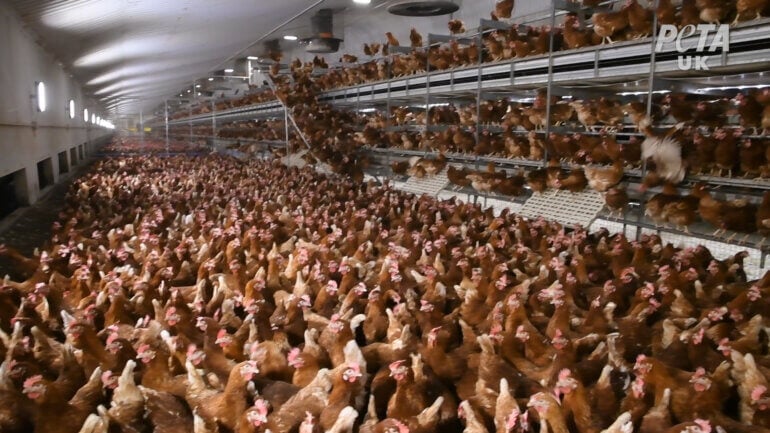
In addition, the hens on farms supplying the Happy Egg Co were provided with only minimal enrichment – items that stimulate their sharp minds and instincts. They were given just two pieces per every thousand birds – a plastic bottle and a bale of hay – which most of them were not even able to access.
No Green, Rolling Pastures
The company’s marketing materials present idyllic scenes in which chickens are given acres of green fields to explore and foliage and trees to play in. Yet the outdoor range filmed at one farm was bare, muddy ground with only a few dilapidated wooden shelters. This setting is unappealing for these naturally nervous prey animals and maybe why few hens were filmed actually spending time out of the shed, let alone rummaging in foliage or perching in fallen trees, as Happy Egg Co claims.
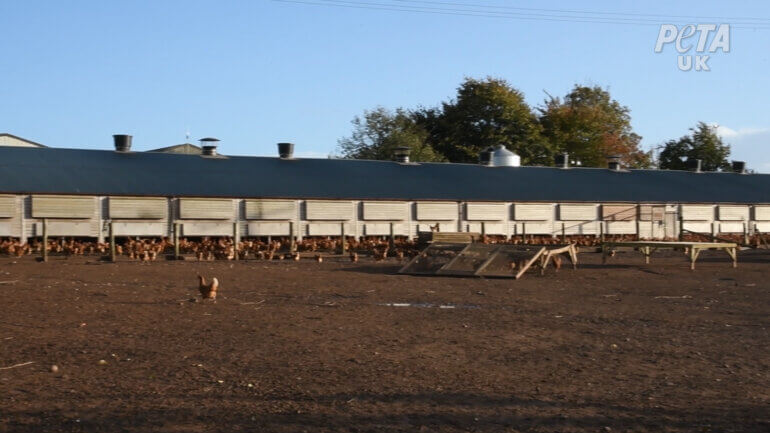
Mutilated and Maimed
The majority – if not all – of the birds seen on farms supplying the Happy Egg Co were found with portions of their beaks cut off. The tip of the beak is a highly sensitive organ, and beak trimming can cause acute and chronic pain. If severe, trimming can also cause painful neuromas – masses of nerves that lead to persistent pain for the rest of the birds’ lives.
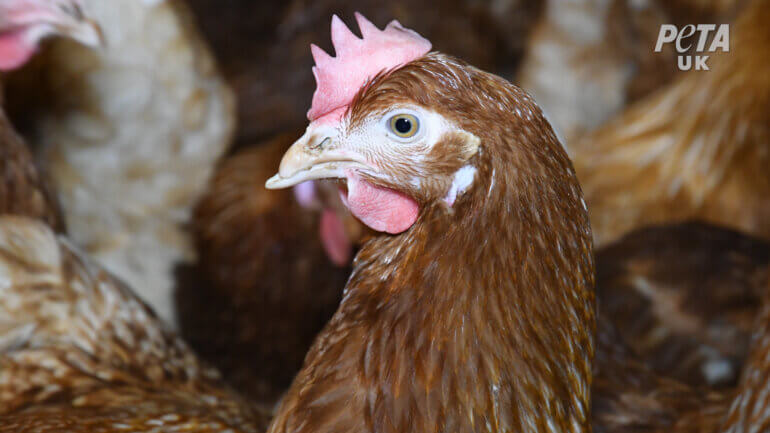
This mutilation is carried out in an attempt to prevent hens from pecking one another or themselves – which they commonly do when placed in stressful, densely packed conditions with barely anything to stimulate their minds. The footage shows that some of the birds were virtually pecked bare. Some were seen with raw skin and bloody wounds.
Exploited and Discarded
Hens used for egg laying on farms have been selectively bred to produce unnaturally high rates of eggs. Wild chickens naturally lay only 10 to 15 eggs per year during breeding season. The process of making and laying an egg requires so much energy that hens such as those on farms supplying Happy Egg have extremely short lives of less than 18 months. During this time, they are kept in facilities that physiologically manipulate them to lay the maximum yield of eggs possible, leaving them physically depleted and emaciated. All are sent to slaughter when their egg production declines.
Crappy Eggs, Not Happy Eggs
Happy Egg Co positions itself in a bright, cheery way to lead consumers to believe that its products come from “happy hens”. A whole section of its website is dedicated to the unsubstantiated and misleading claim that the hens are “happy”.
In reality, we filmed hens in filthy, overcrowded sheds who had been subjected to routine mutilation. As a result of being stressed, frustrated, and kept in unnatural conditions, they likely peck each other’s feathers out until they are red, raw, and bleeding.
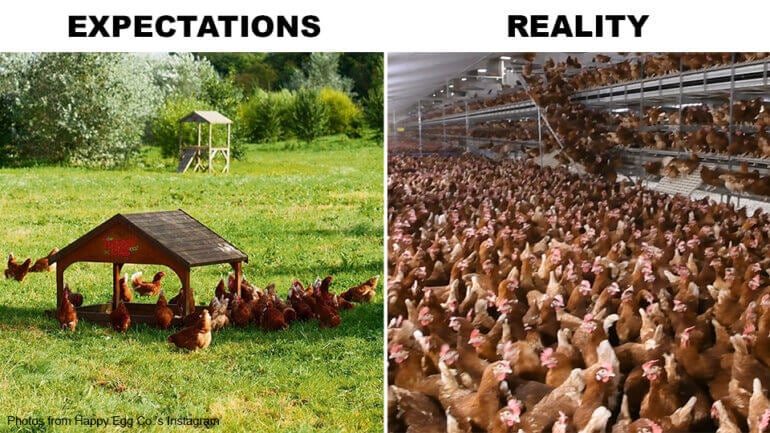
Chickens are sensitive animals who need to preen their feathers, take dust baths, perch at night in order to feel safe, and spend significant amounts of time foraging, exploring, and pecking at food sources. Because chickens cannot perspire, they cool themselves by dunking their beaks in cold water or extending and flapping their wings to ventilate their bodies and separate their feathers. These needs are not met or catered to on the farms we visited, leaving the birds in psychological and physical anguish.
What You Can Do
PETA reported the “Happy” Egg Co to the Advertising Standards Authority (ASA) for duping caring consumers with misleading marketing materials that depict happy hens in lush green fields. We were disappointed that the ASA chose not to uphold the valid points made by PETA and the public despite the horrific images that proved the reality was far from the fantasy created by the brand.
It’s clear that the ASA refuses to take further action to prevent these hens from suffering, so we must speak out and let everyone know that the brand’s “happy” eggs are really crappy eggs. Here’s what you can do:
1. Don’t be duped. The only label that guarantees an animal-friendly product is “vegan”. The best way to help these intelligent animals is to stop eating animal-derived foods, including eggs. Reducing demand for their eggs will help prevent chickens from being forced to live – and die – in these heartbreaking conditions. There are so many great substitutes for eggs that you don’t need to stop eating your favourite meals – just swap a few ingredients. Vegan egg replacers are delicious, can be bought in supermarkets and health food shops, and offer all the taste with none of the cruelty.
2. Speak out for hens. Send a message to the “Happy” Egg Co letting it know you’re shocked by the cruelty seen on its supplier farms and its outrageous, misleading marketing.

